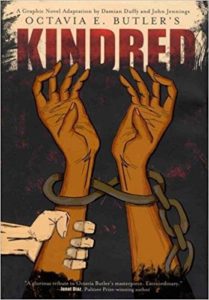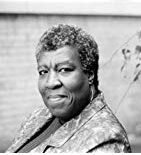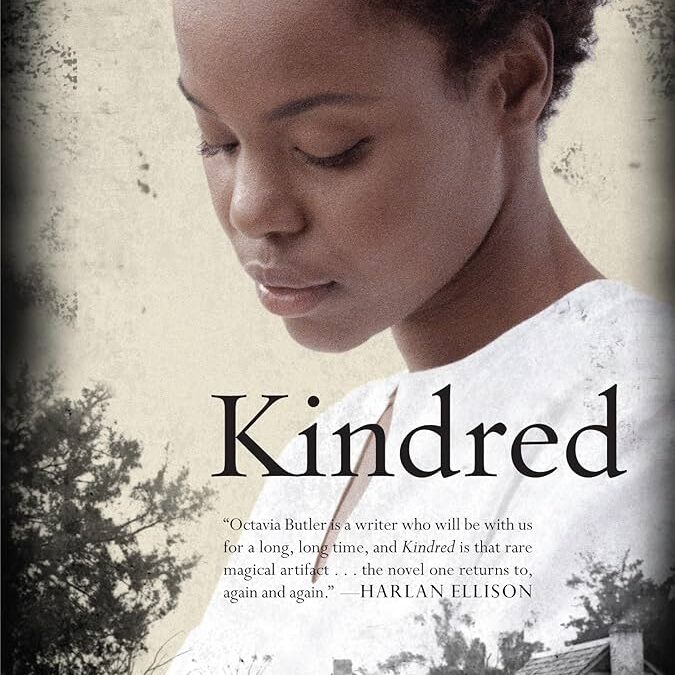Kindred
by Octavia Butler
“Dana, a modern black woman, is celebrating her twenty-sixth birthday with her new husband when she is snatched abruptly from her home in California and transported to the antebellum South. Rufus, the white son of a plantation owner, is drowning, and Dana has been summoned to save him. Dana is drawn back repeatedly through time to the slave quarters, and each time the stay grows longer, more arduous, and more dangerous until it is uncertain whether or not Dana’s life will end, long before it has a chance to begin.”
Review:
Originally published in 1979, Kindred is a brilliant exploration of “the peculiar institution” of slavery. In this historical fantasy, Dana, a twentieth century black woman, is ripped from her time and deposited on a 1820’s Maryland plantation to save a young white boy named Rufus from drowning. When threatened by the boy’s father, she snaps back to her own time, wet and muddy from the river, to the astonishment of her husband who saw her disappear before his eyes only seconds before. This is the first in a series of time displacements that occur whenever Rufus is threatened by death and snaps her back when her own life is threatened. The time elapsed includes only a few months of Dana’s modern time, but years in her life with Rufus (as a boy and later as a young man) and the slaves on his plantation. Over the years Dana spends in Maryland, she and Rufus establish an uneasy relationship based on the threat of mutual destruction. She tries to moderate his anger towards his father and guide him toward a more humane attitude toward his slaves while working and living on the plantation. She holds an ambiguous place in this antebellum society because of her education. She also seemingly has the power to appear when Rufus needs her (looking no older, even when it’s been years since she last disappeared) and heal diseases and ailments with modern cleanliness and aspirin. This arouses fear and consternation among the whites and envy and suspicion from some of the slaves. Octavia Butler is a master writer drawing detailed pictures of her characters and their environments. I put the book down for two days in the middle because I didn’t want to read anymore about the brutality of slavery, but came back because I needed to find out how it ended. Butler’s genius lies in her exploration of violence, power, and relationships between unequal partners: master and slave, father and son, husband and wife. She delves into these relationships with brutal honesty showing how little they’ve changed in the decades between the time slips. She holds a mirror up to modern society and asks uncomfortable questions: How does committing violence to and exercising power over other people corrupt the perpetrator and the victim/oppressed? Questions we’re still trying to answer today. Octavia Butler is one of my favorite authors, but I’ve read primarily her science fiction. This historical fantasy is one of her early books and shows all the promise of her later work. Highly recommended. Here’s the link to a video tribute to Butler and her work.
 The Details:
The Details:
- Title: Kindred
- Author: Octavia Butler
- Publisher: Beacon Press ( reprint 2003)
- ISBN-13: 978-0807083697
- Formats: Hardback, Paperback, eBook, Audio Book, and Graphic Novel adapted by by Damian Duffy and illustrated by John Jennings
About the Author:
 Octavia Estelle Butler, often referred to as the “grand dame of science fiction,” was born in Pasadena, California on June 22, 1947. She received an Associate of Arts degree in 1968 from Pasadena Community College, and also attended California State University in Los Angeles and the University of California, Los Angeles. During 1969 and 1970, she studied at the Screenwriter’s Guild Open Door Program and the Clarion Science Fiction Writers’ Workshop, where she took a class with science fiction master Harlan Ellison (who later became her mentor), and which led to Butler selling her first science fiction stories. Butler’s first story, “Crossover,” was published in the 1971 Clarion anthology. Patternmaster, her first novel and the first title of her five-volume Patternist series, was published in 1976, followed by Mind of My Mind in 1977. Others in the series include Survivor (1978), Wild Seed (1980), which won the James Tiptree Award, and Clay’s Ark (1984). With the publication of Kindred in 1979, Butler was able to support herself writing full time. She won the Hugo Award in 1984 for her short story, “Speech Sounds,” and in 1985, Butler’s novelette “Bloodchild” won a Hugo Award, a Nebula Award, the Locus Award, and an award for best novelette from Science Fiction Chronicle. Other books by Octavia E. Butler include the Xenogenesis trilogy: Dawn (1987), Adulthood Rites (1988) and Imago (1989), and a short story collection, Bloodchild and Other Stories (1995). Parable of the Sower (1993), the first of her Earthseed series, was a finalist for the Nebula Award as well as a New York Times Notable Book of the Year. The book’s sequel, Parable of the Talents (1998), won a Nebula Award. In 1995 Butler was awarded a prestigious MacArthur Foundation fellowship. Ms. Butler died suddenly February 24, 2006 at age 58, most likely from a stroke that caused a fall and fatal head injuries. She is missed.
Octavia Estelle Butler, often referred to as the “grand dame of science fiction,” was born in Pasadena, California on June 22, 1947. She received an Associate of Arts degree in 1968 from Pasadena Community College, and also attended California State University in Los Angeles and the University of California, Los Angeles. During 1969 and 1970, she studied at the Screenwriter’s Guild Open Door Program and the Clarion Science Fiction Writers’ Workshop, where she took a class with science fiction master Harlan Ellison (who later became her mentor), and which led to Butler selling her first science fiction stories. Butler’s first story, “Crossover,” was published in the 1971 Clarion anthology. Patternmaster, her first novel and the first title of her five-volume Patternist series, was published in 1976, followed by Mind of My Mind in 1977. Others in the series include Survivor (1978), Wild Seed (1980), which won the James Tiptree Award, and Clay’s Ark (1984). With the publication of Kindred in 1979, Butler was able to support herself writing full time. She won the Hugo Award in 1984 for her short story, “Speech Sounds,” and in 1985, Butler’s novelette “Bloodchild” won a Hugo Award, a Nebula Award, the Locus Award, and an award for best novelette from Science Fiction Chronicle. Other books by Octavia E. Butler include the Xenogenesis trilogy: Dawn (1987), Adulthood Rites (1988) and Imago (1989), and a short story collection, Bloodchild and Other Stories (1995). Parable of the Sower (1993), the first of her Earthseed series, was a finalist for the Nebula Award as well as a New York Times Notable Book of the Year. The book’s sequel, Parable of the Talents (1998), won a Nebula Award. In 1995 Butler was awarded a prestigious MacArthur Foundation fellowship. Ms. Butler died suddenly February 24, 2006 at age 58, most likely from a stroke that caused a fall and fatal head injuries. She is missed.
